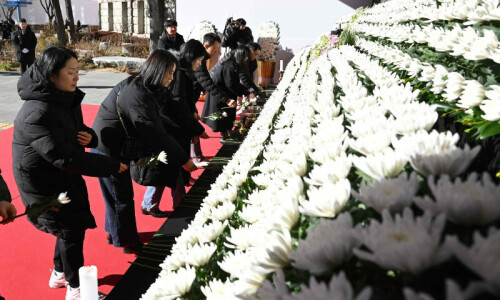IN March 1862, five nuns from the Daughters of the Cross — a Belgium-based congregation — travelled to India and set up a school in Karachi with 10 students on its rolls.
This is how the St Joseph’s Convent School (SJC), one of the finest educational institutions in the city, was founded. Today, 150 years on, the number of its students has grown to over 2,000. Hundreds of thousands have passed through its portals over the years.
Last week, the SJC opened its doors to 90 St Josephines, as the alumni are called, to honour them at its sesquicentennial celebrations. They were dubbed women of substance. One hundred and fifty had been selected but tracing their contacts and dispatching their invitations was quite a challenge. Nevertheless it became a ‘memorable occasion’, to quote Shahnaz Wazir Ali, special assistant to the prime minister and more importantly a product of SJC, who was the chief guest. Her eloquent tributes to her alma mater echoed the feelings of all those present on the occasion.
At a time when the country is faced with an ‘education emergency’ launched by Shahnaz Wazir Ali herself, the SJC experience has some lessons to offer. In an age of commercialisation of education, the SJC’s focus has continuously been on ‘Continuing Excellence in Education’ while remaining a not-for-profit institution.
This also has significant implications for society as its traditionally modest fees have enabled students from all economic strata to seek admission. What better strategy could there be to promote social integration than to allow a mix of such children to study and play together and thus understand and respect their fellow beings. As the forces of the marketplace gain momentum one hopes the SJC will retain its traditional values.
One is curious to learn the secret of this excellence. It is its faculty and the ability of the school to hold on to its teachers, motivate them and bring out the best in them. There are three teachers, namely, Sabra Siddiqi, Aileen Soares and Niceta Dias, who have been with the SJC for over 50 years. The iconic headmistress Shafiqa Fikree, remembered and loved by her students for years after they had graduated, would have been the fourth had she not passed on. Fifteen have completed a quarter of a century with three having crossed the fourth decade. These teachers are the stuff all teachers should be made of if Pakistan’s education is to make headway.
Their long stay at the wicket gives the school stability. They provide a sense of security to the students apart from being the means of transmitting values and knowledge to them. The good ones become mentors which every child needs. At the end of the day, what really counts is the character, knowledge and skills of the students who emerge from an institution.
The education of St Josephines has been shaped by the words of wisdom uttered 150 years ago by the founder of the order and the first superior general, Mother Marie Therese, “Education is not merely the imparting of knowledge….but the training of the judgment is its most important work for this will enable the growing girls to appreciate things at their true worth; to distinguish between the good and the bad, the true and the false.…”
But that doesn’t mean that the school is still stuck in the past and has not kept pace with the times. New technologies and pedagogies have been acquired and the computer lab so meticulously set up in the 1980s and managed by Naseema Kapadia, today the headmistress of the Cambridge section, testifies to the modernity that has been embraced so judiciously by the SJC. It is this blend of continuity and change that lies at the heart of SJC’s success story.
A few days after the overwhelming experience of the 150th anniversary celebrations I drop in at the convent to pay my respects to the nuns whose contribution to education has touched many lives. Sister Zinia Pinto, who was my contemporary at university (she has been a St Josephine since 1956 when she joined as a teacher), speaks of the pride and happiness she feels when she meets her former students. “We firmly stood for girls’ education and we believe we managed to achieve something,” she remarks happily.
But at times decisions had to be taken which she regrets but they couldn’t be helped. “We had to turn away many applicants seeking admission because we didn’t have the capacity. The swimming pool had to be shut down due to water shortage. The boarding house was closed down and we became only a day school because the space was needed for a training centre,” she reminisces wistfully.
Sister Dolores Anne, who was my favourite teacher when I was a teenager in school and she had not become a nun, reminds me that the Daughters of the Cross are ‘an active congregation’ and not a cloistered one. They step out of the convent to undertake ‘works of mercy’ for the uplift of the downtrodden. Sister Margaret, who was the headmistress of the junior section when my daughters were her students, tells me of the work they undertake in prison for female prisoners, the other schools they run in the rural areas of Sindh and the classes they organise for the street children of Karachi — over 200 of them — who clean cars in the morning and come to the SJC in the afternoon to study.
This is service to humanity at its best and demonstrates how the spirit of sharing with the disadvantaged can be translated into action. That is what Pakistan needs.









































